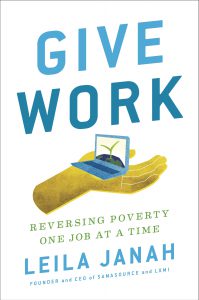Since 2008, social enterprise Samasource has provided over $10 million in direct income to tens of thousands of the world’s most marginalized citizens, including refugees, orphans, and slum dwellers in Haiti, India, Kenya, and Uganda by connecting them to work in the globalized digital economy. Now, through her new book “Give Work: Reversing Poverty One Job at a Time,” Samasource founder and CEO Leila Janah is sharing both her personal path to success as a social entrepreneur and making the case for a new solution to global poverty.
“Give Work” is part origin story, part defense of Janah’s thesis on why “impact sourcing” — designing a business model around intentionally hiring low-skilled labor through the digital economy — has been the missing link in poverty alleviation efforts in both the international aid community and corporate social responsibility efforts. In addition to featuring personal stories of struggle and adversity among the population Samasource serves, Janah highlights the ingenuity, drive, and dedication of employees who rise to the opportunity of professional advancement when granted access to steady, fair-wage employment. These anecdotes emphasize her proposition that it is lack of opportunity — not flawed character or poor potential — that undermines billions of people at the lowest end of the economic spectrum.

Janah earnestly recounts the harrowing, first-hand encounters with slum-dwellers in Kenya and refugees in Sudan that inspired her to depart from an international consulting job post-Harvard and develop a business model that could offer people living in destitution a chance at a better life. She is more candid than most in describing her struggles with the doubt and loneliness that plague many entrepreneurs driven by idealism, and it’s arguably Janah’s humility that contributed to the eventual success of Samasource.
As a first-generation American woman of color, Leila Janah was not a traditional tech entrepreneur. After years traveling the world and developing close connections with some of the leading minds in microfinance and impact investing, she experienced the same disillusionment with the international aid movement that struck many students and scholars in the early 2000’s: charitable giving was making donors feel good and offering short-term relief, but wasn’t doing much to address deep, underlying systemic flaws that perpetuated poverty in most parts of the world. The insight she put into practice was that offering access to steady income allows recipients with the long-term ability to procure their own needs without dependency on top-down donors, and to do so accordingly to their own values and preferences. It is the fundamental first step in a virtuous cycle.
While the benefits of job creation weren’t news, Janah was able to identify the power of digital work to extend employment to people living in countries plagued by stagnant economic growth, corruption, rural isolation, and other barriers to entry. With internet connections and computers becoming available in nearly all corners of the globe, Janah sees digital work as a step toward leveling the playing field of economic opportunity where geographic barriers and destiny of birth have perpetuated cycles of poverty for generations.
With internet connections and computers becoming available in nearly all corners of the globe, Janah sees digital work as a step toward leveling the playing field of economic opportunity where geographic barriers and destiny of birth have perpetuated cycles of poverty for generations.
This book is well-suited for anyone with knowledge or experience in the international development field or poverty alleviation efforts who has become disillusioned with the state of charitable aid. It makes a strong argument for why Samasource is a viable business solution (not a philanthropic spend) for tech companies seeking digital labor, and provides a wealth of anecdotes that support how and why this work is beneficial to employees. The book is also full of well-articulated observations on inefficient systems and social institutions that perpetuate exploitation and thwart humanitarian efforts, from outdated management and funding structures of nonprofits to the deeply pervasive and damaging stereotypes around women and the poor. It challenges the black-and-white altruism of the “buy one, give one” business model, and challenges social entrepreneurs to go deeper and address underlying root causes of inequality by applying their ingenuity and grit to business models that generate long-lasting return.
While the story of Samasource is inspiring and one of unquestionable perseverance, some may find it difficult to relate to Janah’s start-up journey as a Harvard graduate with an extremely influential social network. The book leaves little doubt that if it weren’t for her alumni connections and access to top influencers in the impact investing space, Samasource may still be a struggling venture. This is not to discount the potential that passionate, highly educated individuals possess to address systemic inequality. But there are thousands of people who work tirelessly to provide employment and opportunity for social mobility on a daily basis around the world whose direct (and in some cases lifelong) experience of poverty makes them both acutely knowledgeable of the systems that need to change and simultaneously alienates them from access to the capital and connections needed to turn their ideas into scalable, thriving enterprises.
Janah’s direct ask of the reader is to examine how they can incorporate impact sourcing into their own businesses, but after reading about the uphill battle she faced getting Samasource off the ground, the book indirectly begs the question of why start-up capital is not more readily available in the regions Samasource serves to begin with. Overall a worthy read, “Give Work” will leave you thinking hard about the big picture, and optimistic in the power of social enterprise to shift global tides.






